
In 2024, iCloud Separation How To Disconnect Apple iPhone SE and iPad

iCloud Separation: How To Disconnect Apple iPhone SE and iPad
Managing your iCloud is important to maintain the security of your Apple devices. Your iCloud account is the central hub for your photos, documents, contacts, and more. It’s essential to ensure that your devices are safe and secure. However, there are scenarios when you might want to remove it.
The page below will guide you on how to disconnect your Apple iPhone SE from iCloud. It highlights the benefits of having full control over your data. Below, you can learn how to disconnect from iCloud,keeping your data organized and secure. Explore the article to learn more.
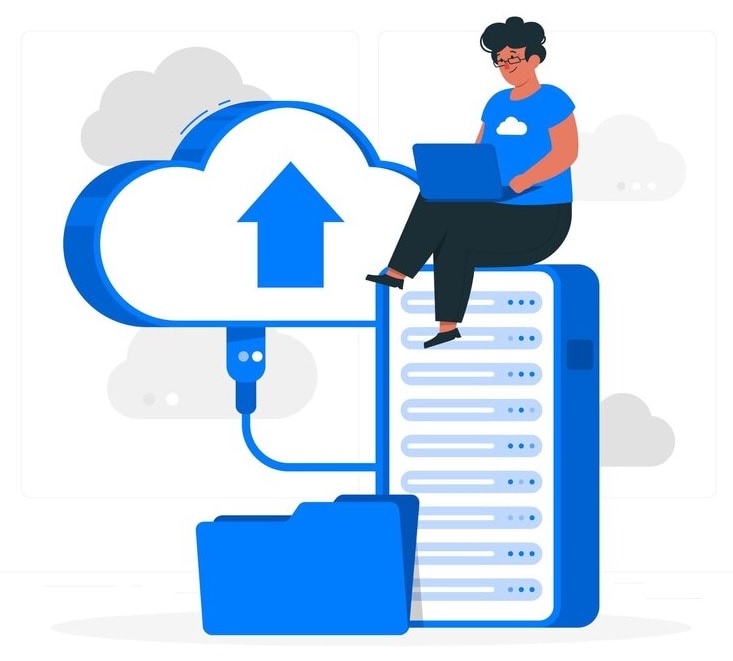
Part 1. Why Disconnect From iCloud?
iCloud is one of the most integral parts of the Apple ecosystem. It syncs your data across devices and ensures a connected digital experience. Yet, there are times when disconnecting from iCloud is necessary. Below are some specific reasons why you should learn how to disconnect your iPad/iPhone from iCloud.
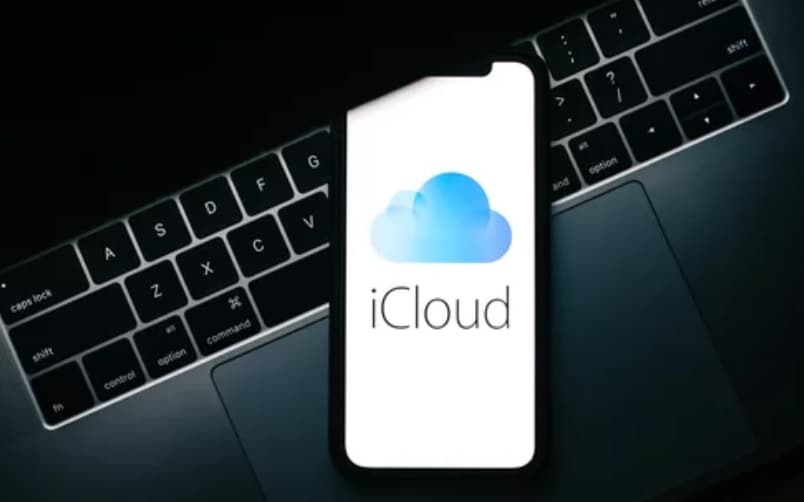
Privacy Concerns
Privacy is an important concern in today’s digital age. Disconnecting from iCloud can provide a layer of security. It prevents sensitive information like photos, contacts, and documents from being stored in the cloud. This is important if you prefer to maintain complete control over your data.
Selling or Giving Away Your Device
When you decide to sell or give away your Apple iPhone SE or iPad, it’s essential to disconnect it from iCloud. Failing to do so could allow the new owner access to your data. Disconnecting ensures your device is wiped clean of your iCloud information, protecting your privacy.
Limited Storage Space
Apple offers a limited amount of free iCloud storage. If you’ve reached or exceeded your storage quota, disconnecting certain devices can help free up space. It can also prevent annoying notifications about running out of storage and keep your backups and documents accessible.
Changing Apple ID
If you decide to change your Apple ID for any reason, disconnecting from iCloud is necessary. This operation allows you to reconnect your old ID to a new one if necessary. It ensures that all purchases, app downloads, and data are linked to the new ID.
The benefits of disconnecting from iCloud include enhanced security and privacy. Disconnecting your iCloud account can also lead to reduced usage. It’s great for users who want more control over their data or prefer to keep their devices offline.
Part 2. Disconnect iPhone/iPad From iCloud Through 6 Manners
Learning how to disconnect aniPhone or iPad from iCloudcan be necessary for various reasons. To guide you through the process, here are six methods to do so.
Use Settings To Access iCloud
- Step 1: Open the Settings app on your Apple iPhone SE/iPad. Next, tap your name at the top, where your Apple ID is listed.
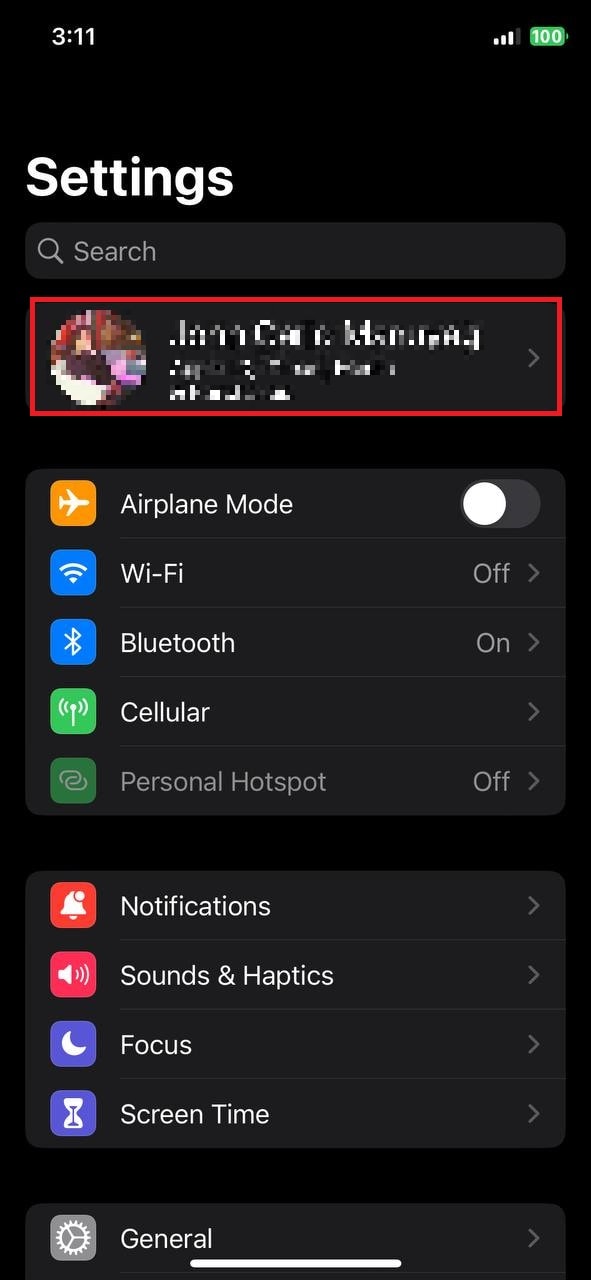
- Step 2: Scroll down and tap Sign Out. When prompted, type in your Apple ID and password. Next, choose TurnOff for the data you want to keep on your device. Afterwards, your Apple iPhone SE or iPad is now disconnected from iCloud.
Visit iCloud.com
You can also remove your iCloud account on your Apple iPhone SE/iPad by visiting the iCloud.com website. Here’s how.
- Step 1: Launch a web browser on your computer or another device. Visit iCloud.com and sign in with your Apple ID.
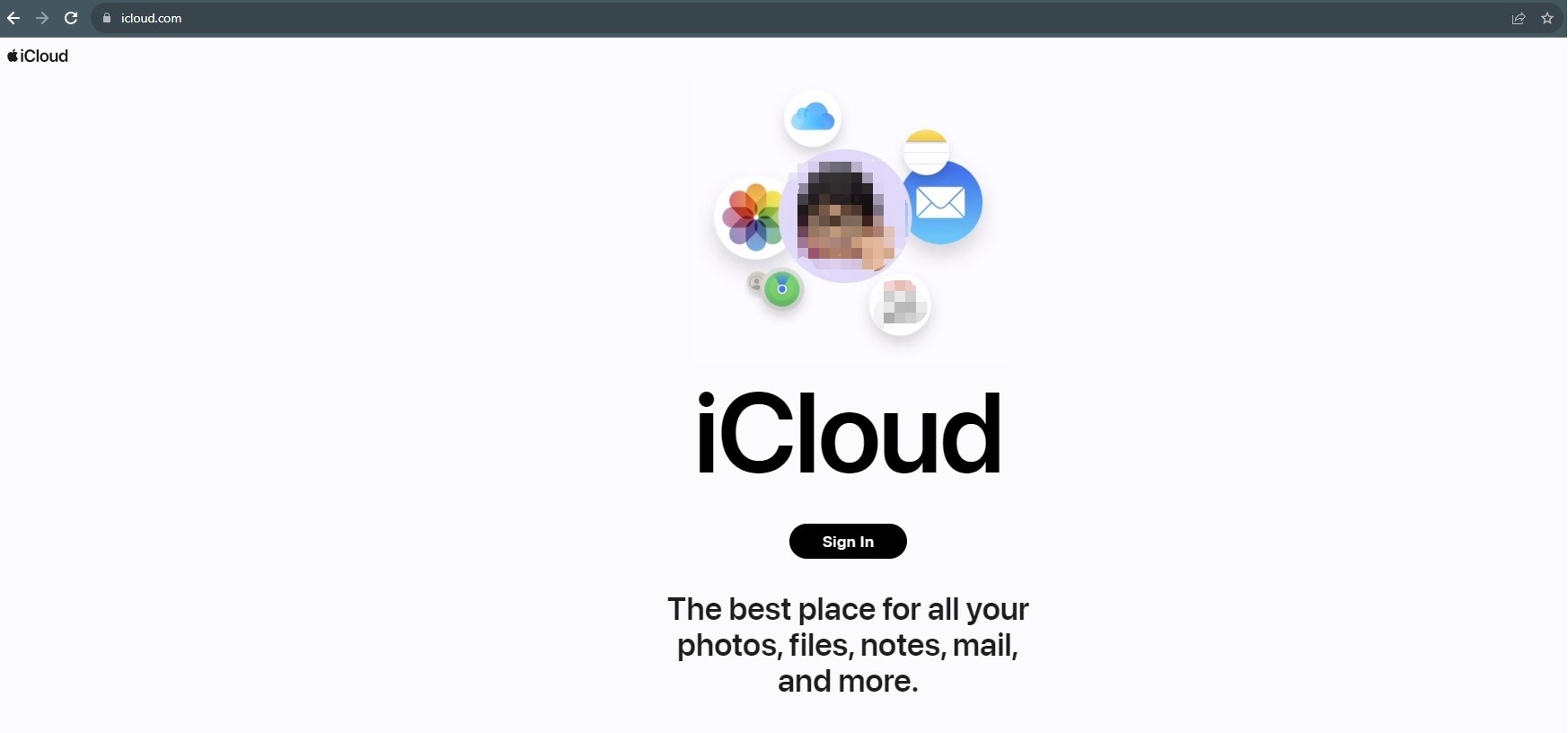
- Step 2: Click AccountSettingsin the interface and scroll down. Choose the option to Sign Out of All Browsers. Next, confirm your choice to disconnect your iCloud from your Apple iPhone SE or iPad.
Factory Reset
Performing a factory reset can cause all data on your device erased, effectively disconnecting it from iCloud. Here’s how.
- Step 1:Go to your device’s Settings. Next, tap on General> Reset. ChooseErase All Content and Settings.
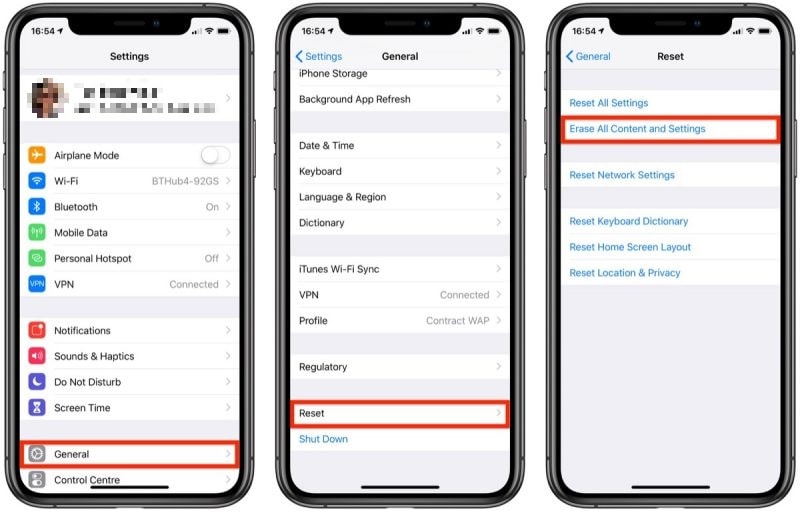
- Step 2: You’ll be prompted to enter your passcode and Apple ID password. Enter your details and confirm the reset.
Note
Be cautious with this method, as it will erase all data on your device.
Use the Find My App (iOS 13 and later)
You can use the Find My app to remove an iCloud account from a specific device. Here are the steps below.
- Step 1: Open the Find Myapp on your device. Next, tap the Devicestab at the bottom.
- Step 2: Select the Apple iPhone SE device you want to disconnect. Afterwards, tap Remove This Device. Once you confirm your choice, it will disconnect the Apple iPhone SE device from an iCloud account.
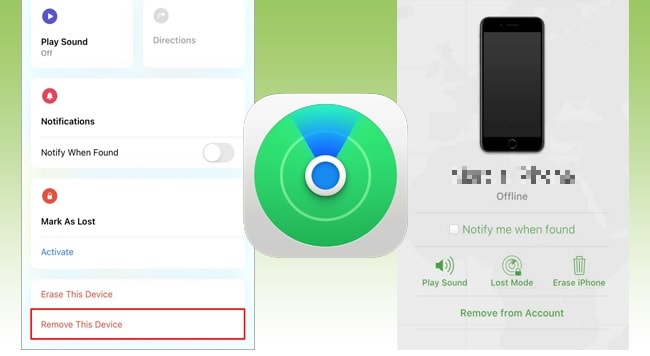
Contact Apple Support
If you encounter issues disconnecting your device from iCloud, contacting Apple support is a wise choice. It’s a good option if you have difficulties using the previous methods. They can guide you through the process and offer personalized assistance.
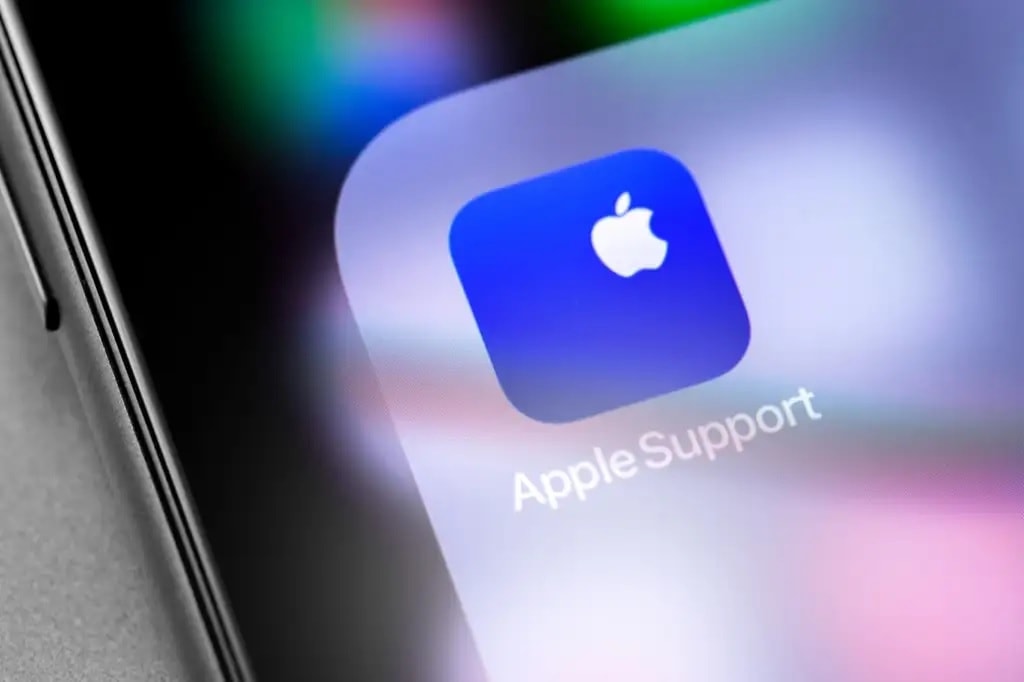
Use a Third-Party Tool
If you’ve tried all the options and even contacted Apple support but still face persistent issues, it might indicate more serious problems. If it detects unusual activity, your Apple iPhone SE or iPad might trigger iCloud’s Activation Lock. A trusted third-party tool like Wondershare Dr.Fone- Screen Unlock can work wonders in such cases.
Part 3. Steps To Remove iCloud From iPhone/iPad With a Flexible Alternative-Wondershare Dr.Fone
Dr.Fone is a flexible alternative tool that can remove iCloud from your Apple iPhone SE or iPad. Your Apple iPhone SE or iPad will most likely trigger iCloud’s Activation Lock if all the steps above do not solve your issue. In that case, Dr.Fone - Screen Unlock can help you bypass it, allowing you to regain control of your device. The steps below show you how to disconnect from iCloudin 3 simple steps.
- Step 1: Start by downloading and installing Dr.Fone on your computer. Once installed, launch the program. Click Toolbox> ScreenUnlock> iOSto move on to the next process.

- Step 2: On the next window, select iCloud Activation Lock Removal to initiate the process. Next, connect your Apple iPhone SE/iPad to the computer with a USB cable. Wait for Dr.Fone to recognize your device, and it will lead to the next screen.
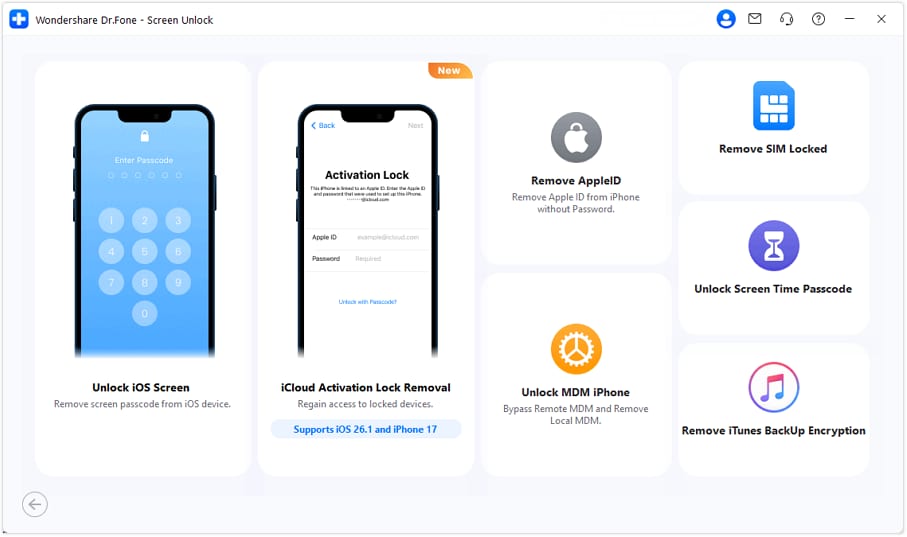
- Step 3: Follow the next on-screen instructions. Afterwards, Dr.Fone will automatically remove the ActivationLockdisplayed under the progress bar.
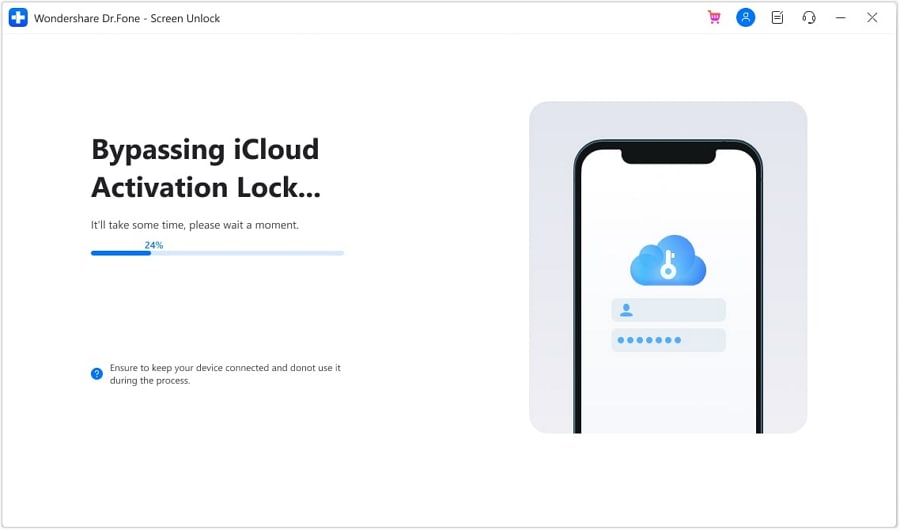
Once the process is completed, you should see the completion message below. Select Done to finish the removal of the iCloud Activation Lock on your Apple iPhone SE or iPad. A successful process will automatically remove the iCloud on your device.
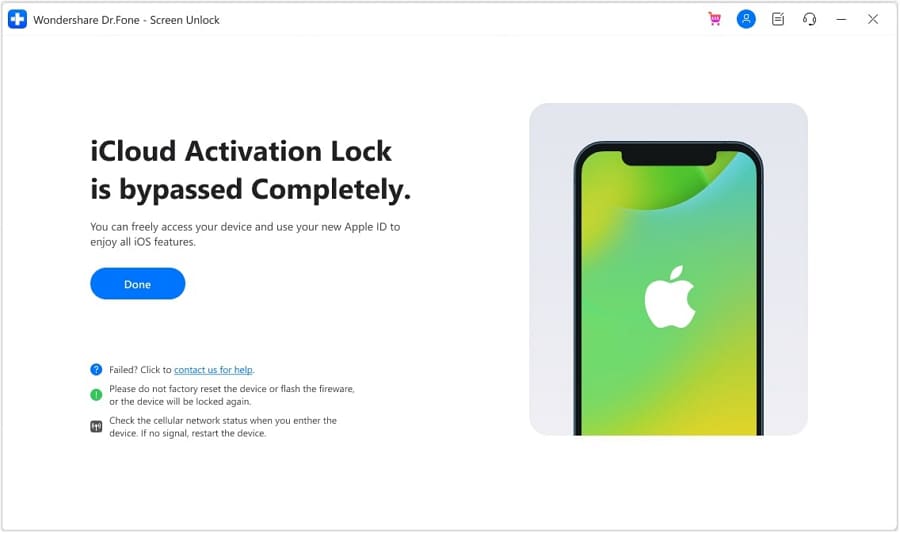
Part 4. How Dr.Fone Can Benefit You in Other Aspect
Dr.Fone goes beyond bypassing the iCloud activation lock. It offers a wide range of essential features that can enhance your device management and data recovery capabilities. Below are some key features that make Wondershare Dr.Fone a reliable tool.
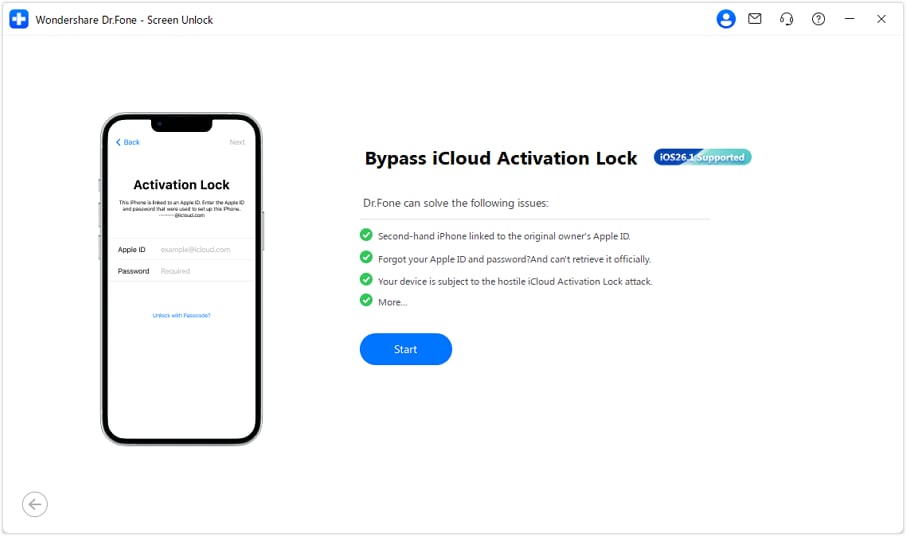
- Unlock Apple ID without a Password. Dr.Fone allows you to unlock your Apple ID without needing a password. The feature is helpful if you’ve been locked out of your account or face authentication issues.
- **Remove SIM Lock/Phone Carrier.**The tool can also remove SIM locks and phone carrier restrictions. This feature allows you to use your device with any carrier or SIM card.
- **No Data Loss.**A crucial advantage of Dr.Fone is its ability to perform all these operations without causing data loss. Your precious data, apps, and settings remain intact throughout the process.
Apart from its iCloud-related capabilities, Dr.Fone offers a comprehensive set of tools for managing your iOS device.
Data Recovery
Dr.Fone can help you recover lost or deleted data. Retrieve your messages, photos, videos, contacts, and more. The feature is a lifesaver when accidental data loss occurs.
Phone Manager
You can manage your device’s data directly on your computer. Transfer files and easily perform tasks like importing, exporting, or deleting content.
Phone Backup
Dr.Fone provides robust backup solutions. The platform allows you to create backups of your device and restore them when needed. It’s an essential part of maintaining the integrity of your data.
Conclusion
Managing your iCloud is essential for maintaining privacy and control over your Apple devices. The various methods on how to disconnect your Apple iPhone SE from iCloudcater to different scenarios. Whether you disconnect using device settings or the flexibility of third-party tools like Dr.Fone, the choice is yours.
With these options at your disposal, you can tailor your data to meet your specific needs. Always remember that having a handy third-party tool like Dr.Fone can put your data worries at ease. It ensures you have another method of how to disconnect from iCloudfor any iCloud-related concerns.
How To Delete iCloud Account: Remove Your Apple ID Permanently On Apple iPhone SE
Searching “How to delete iCloud account?” If you want to delete an iCloud account, you must delete an Apple ID account. And before you take this irreversible step, it’s crucial to understand the implications. Deleting your Apple ID account means permanently erasing all contents stored in your iCloud, such as media and documents. You’ll also lose access to essential Apple services such as the App Store, iMessage, and iTunes.
Deleting your Apple ID is a significant decision that should not be taken lightly. Proceeding with Apple ID deletion is a final decision. Once initiated, there’s no turning back. If you’re certain about it, refer to this article for a step-by-step guide on how to delete iCloud account and explore alternative options if you need it.

Part 1: Deleting iCloud Account? Essential Preparations Before You Proceed
Before you learn the steps on “how to delete icloud account,” take steps to ensure a smooth transition and prevent the loss of valuable data. Before you permanently remove an iCloud account, ensure you’ve completed the following:
Backup Your Data
Create a local copy of your files, photos, videos, and documents on your computer or an external hard drive. You can use cloud storage services or third-party apps like Wondershare Dr.Fone to selectively restore it later.
Request a Copy of Your Data
Apple provides a service on selected regions that allows you to request a copy of data associated with your Apple ID before deleting your account. It includes records of your sign-in, account details, iCloud contents, and Apple retail store transactions. Having a copy of this data can be useful if you need to access it in the future.
To request a copy of your data, go to Privacy Apple on your web browser. Under the Obtain a copy of your data section, click Request a copy of your data. Next, select the data you need and click Continue.
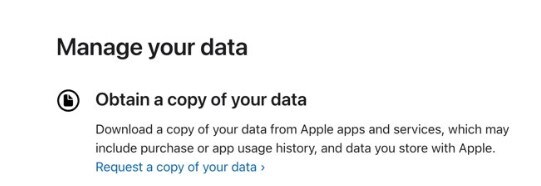
Review Your Active Subscriptions
Also, to “delete iCloud account,” first review any active subscriptions you may have, such as Apple Music, Apple TV+, or iCloud+ storage. If you don’t want to continue these subscriptions, cancel them before deleting your account.
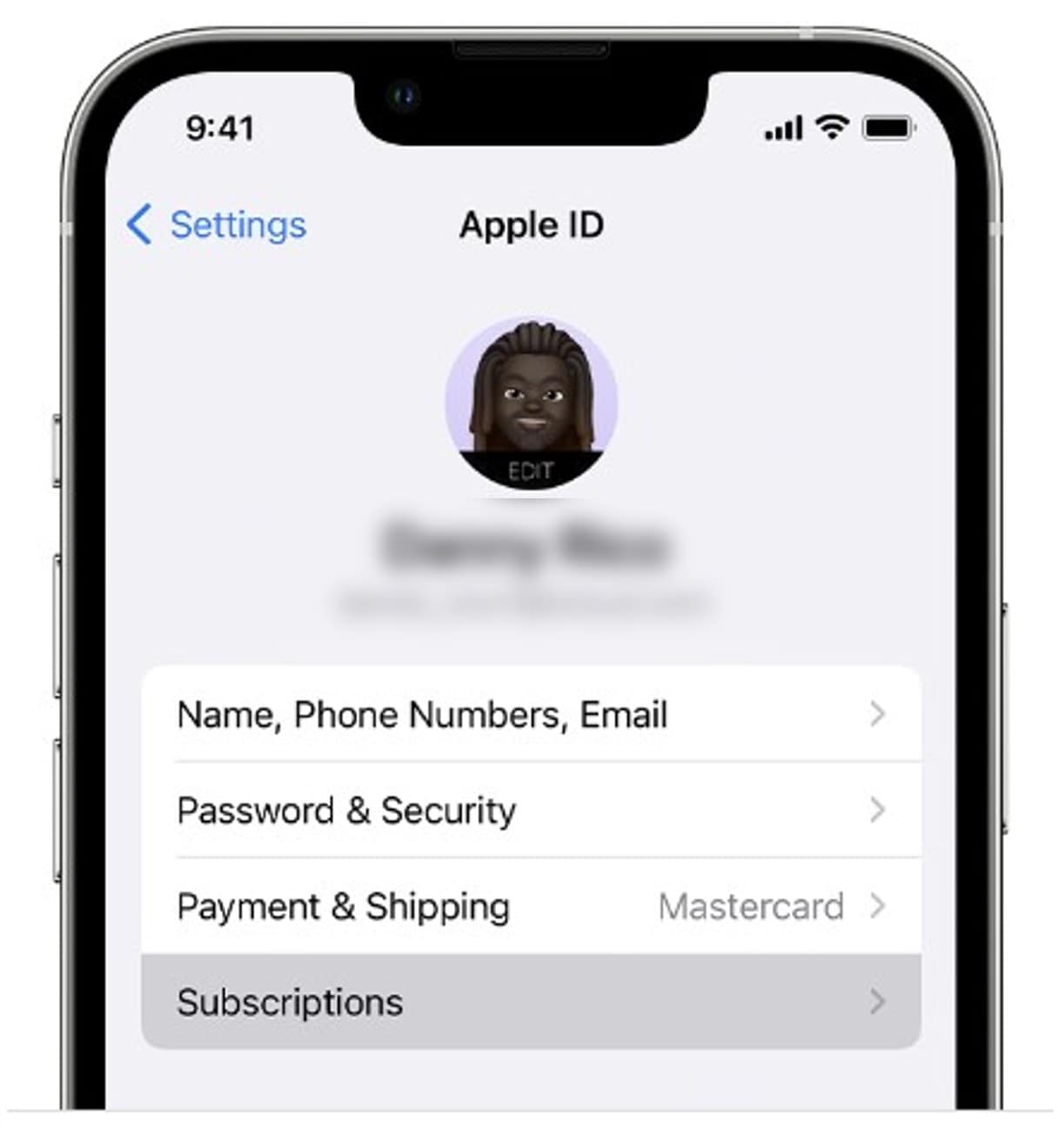
Download Backups of Your Apps, Games, Music, Movies, TV Shows, Books, and Audiobooks
Your iCloud account may contain backups of your apps, games, and media purchases. Before deleting your Apple ID account, download them to your device or a computer to ensure you don’t lose access to your favorite content.
Pay Loan Installments You Have With Apple Pay Later
If you have an outstanding loan with Apple Pay Later, pay off any remaining installments before you delete your iCloud account. Otherwise, you may incur late fees or other penalties.
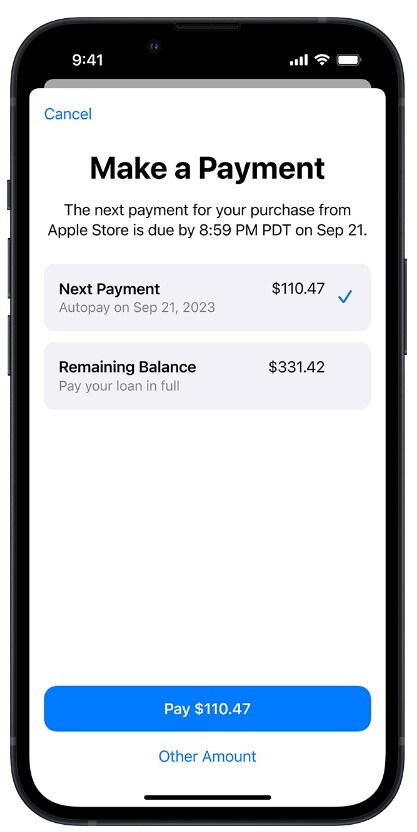
Sign Out of Your Devices and Web Browser
Before deleting your iCloud account, ensure you sign out of your account on all devices, including iPhones, iPads, Macs, and web browsers. Failure to sign out of an account can lead to several potential risks and inconveniences, including:
- Restricted device access
- App malfunctioning
- Constant Sign-in errors
- Web browsers retain your Apple ID information
Part 2: Remove iCloud Account Without Deleting: Maintaining Your Apple ID
Removing an iCloud account from your device doesn’t necessarily mean deleting the account itself. It simply means signing out of your iCloud account on that device. Your iCloud data remains intact and accessible from other devices.
However, when you sign out of iCloud on your device, you will be signed out of all Apple services that use your iCloud account. It includes Apple Pay, Find My, iCloud Mail, Siri Shortcuts, and others. You need to sign in with your Apple ID to use these services again.
Remove iCloud Account on iPhone
Here’s “how to remove iCloud account“ from your Apple iPhone SE without deleting the account:
- Step 1: Open the Settings app, then tap the Apple ID at the top of the Apple iPhone SE screen.
- Step 2: Scroll down, tap on Sign Out, enter your Apple ID password, and tap on Turn Off.
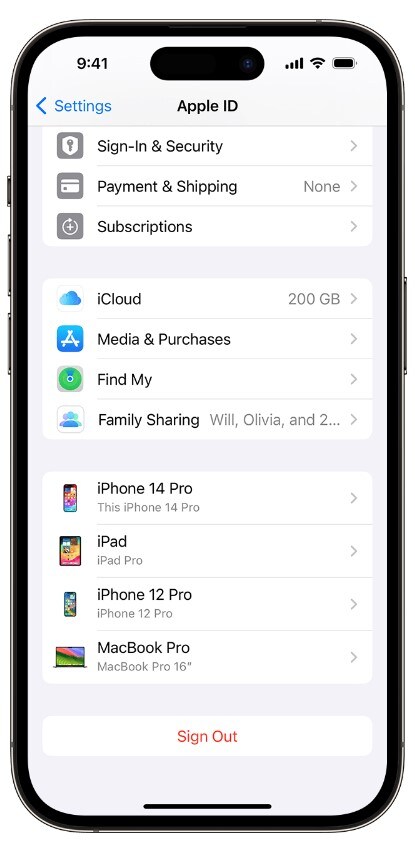
- Step 3: Tap on Sign Out to verify.
Remove iCloud Account on Mac Device
Follow these steps below to remove an iCloud account from your macOS Ventura or later:
- Step 1: Click on the Apple logo in the top left corner of your screen, then choose System Settings.
- Step 2: Click on the Apple ID icon and click Sign Out.
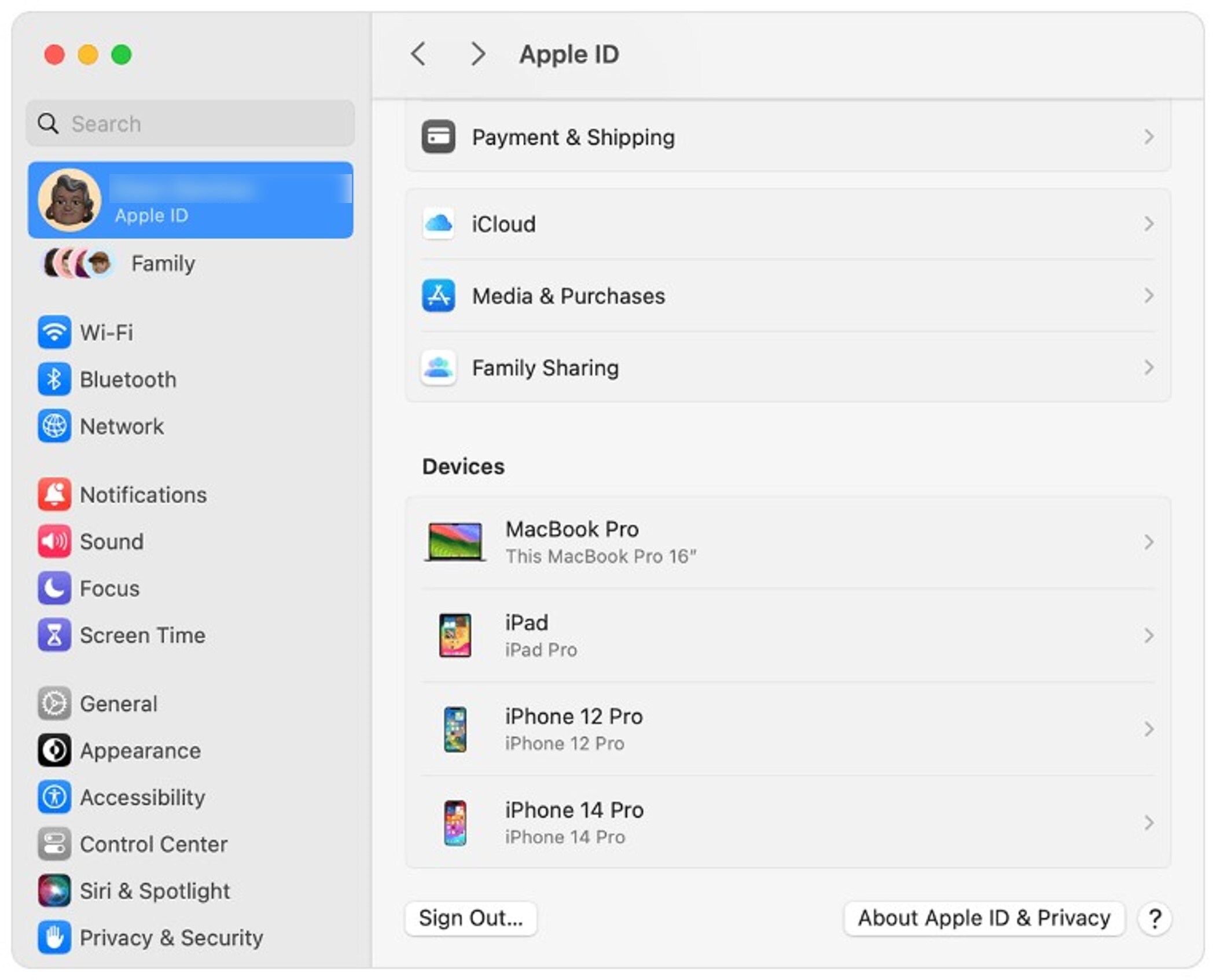
- Step 3: Select the data files you want to save, then click Keep a Copy.
Part 3: How To Delete iCloud Account Permanently?
Deleting your Apple ID has effects beyond the loss of data and services. These include:
- Apple will not be able to recover your Apple ID or any associated data once deleted.
- After deleting your iCloud account, any messages sent to you via iCloud Mail or iMessage will not be delivered.
- If you have any unused credit balance in your iCloud account, you cannot redeem or refund it upon deletion.
- The email address associated with your deleted Apple ID becomes unavailable for creating a new Apple ID.
If you are sure of your decision and have prepared for the consequences, here’s how to permanently delete your iCloud account:
- Step 1: Open a web browser and visit Apple’s privacy website: privacy.apple.com. Sign in using the Apple ID associated with the iCloud account you want to delete.
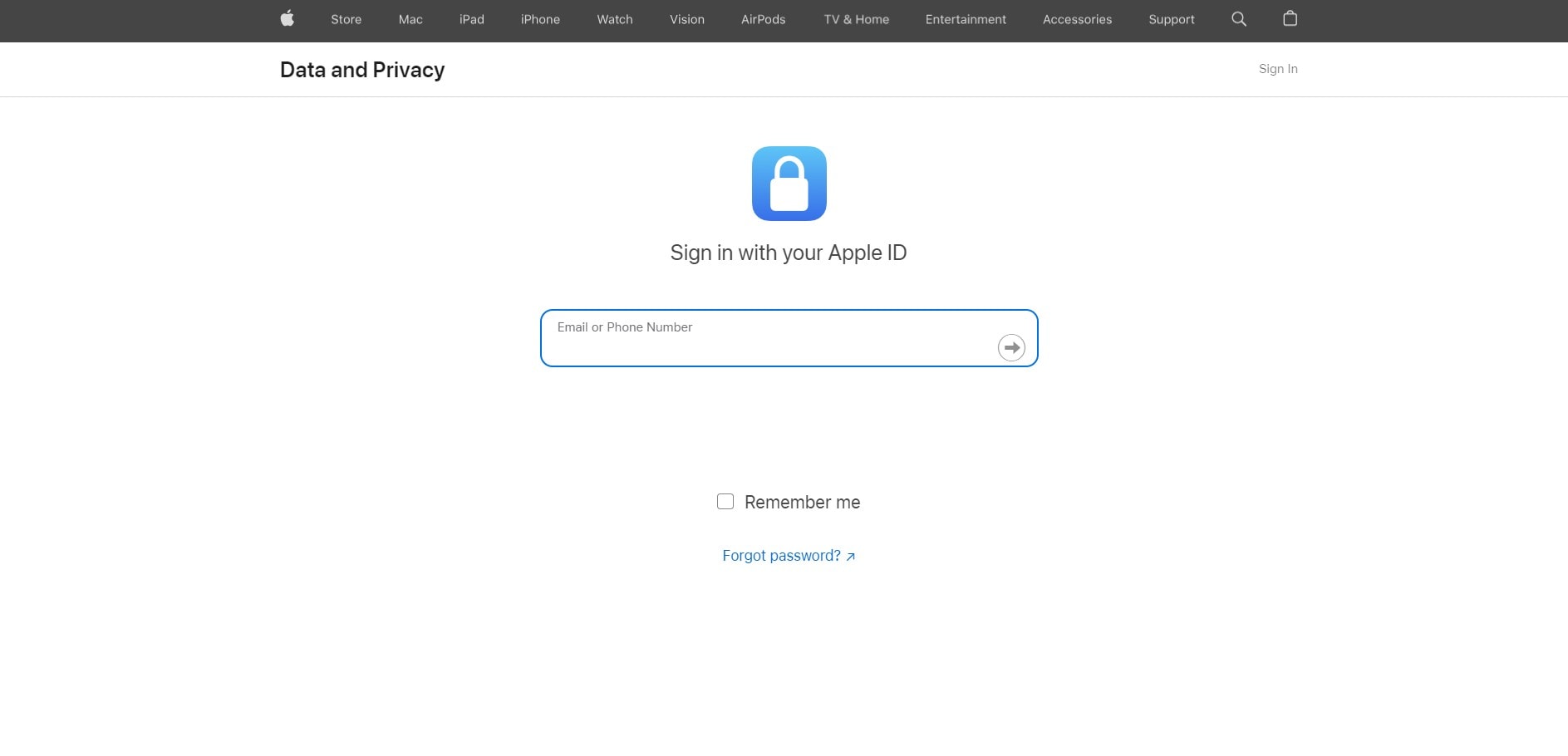
- Step 2: From Delete your account section, click Request to delete your account.
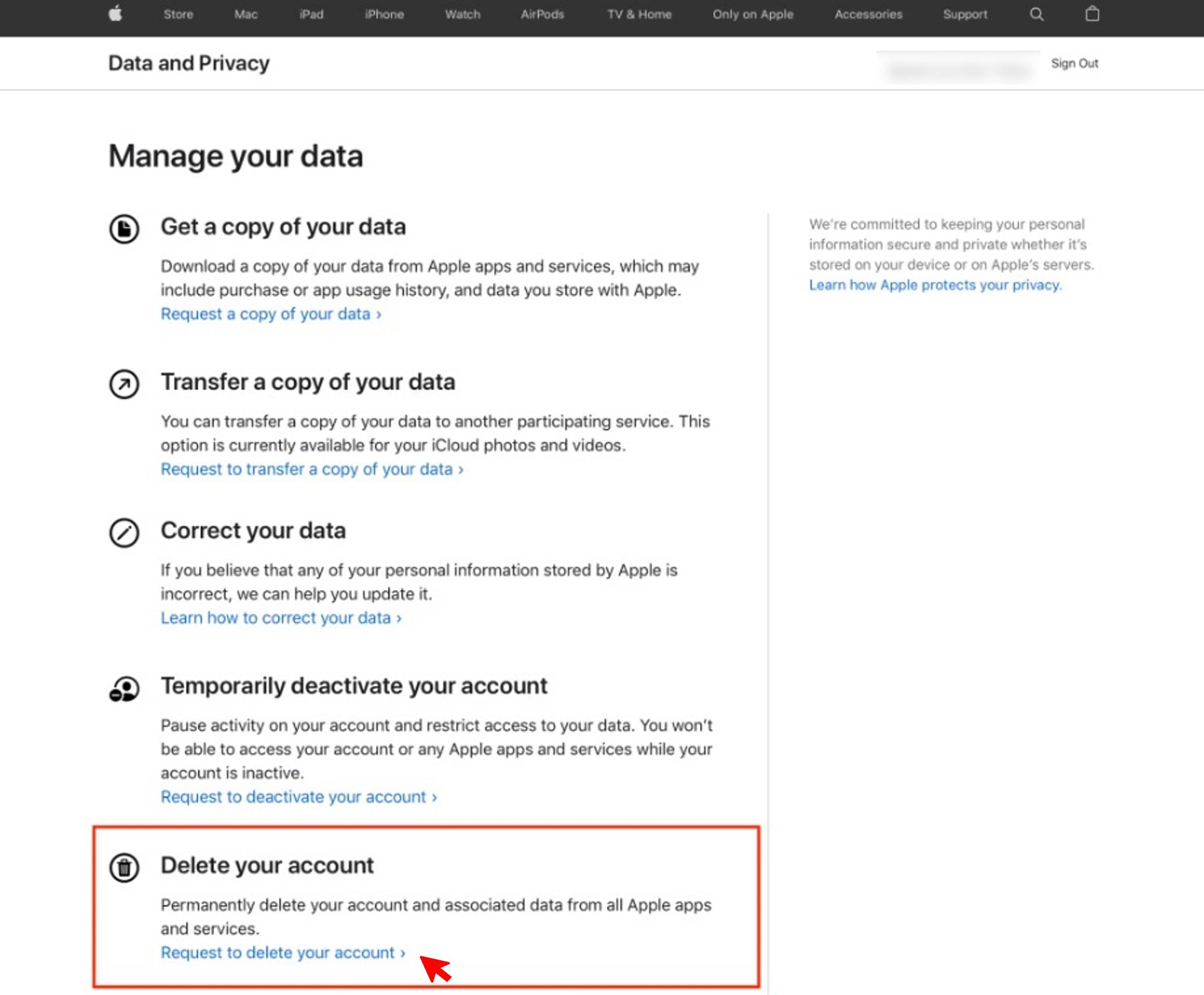
- Step 3: Choose a reason from the provided options in the drop-down menu for deleting your iCloud account, then click Continue.
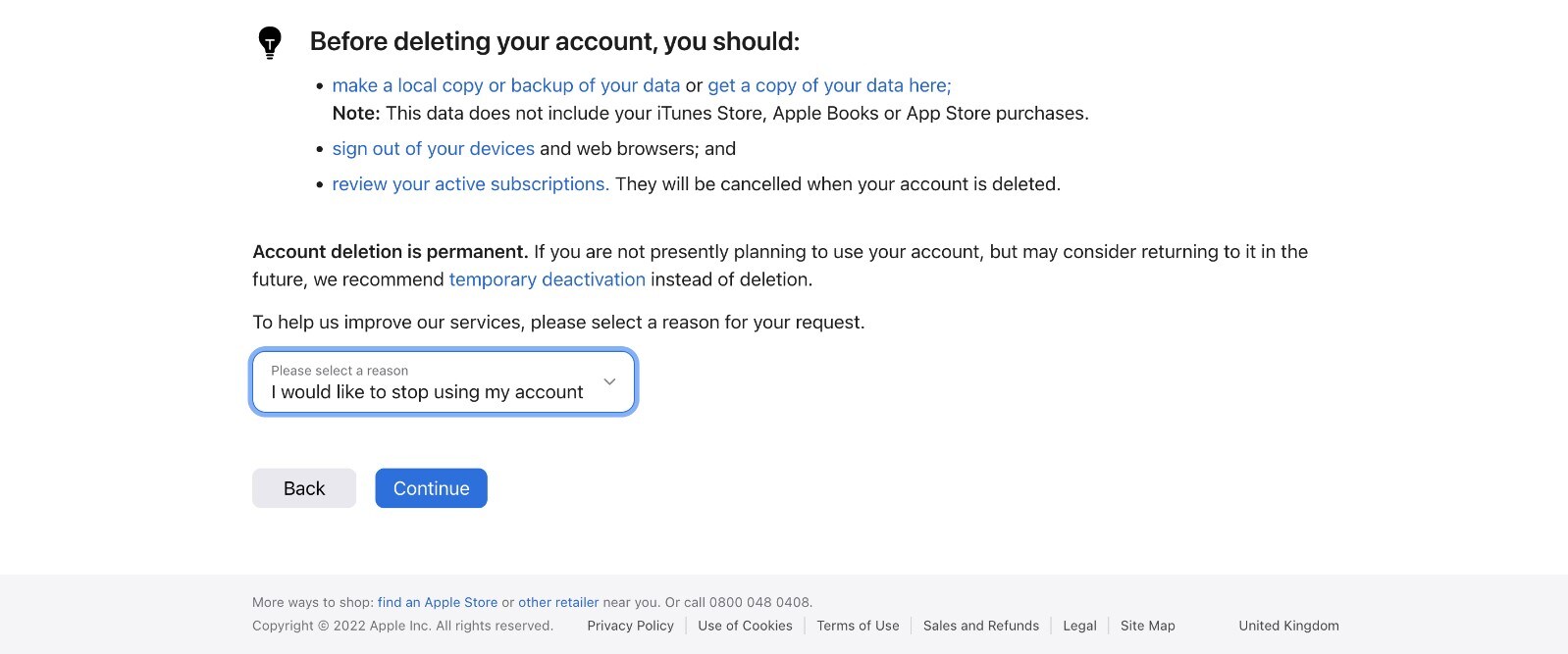
- Step 4: Review the information displayed, ensuring you want to proceed with deleting your iCloud account. Click Continue.
- Step 5: Choose where Apple can send you updates regarding your deletion request. Click Continue.
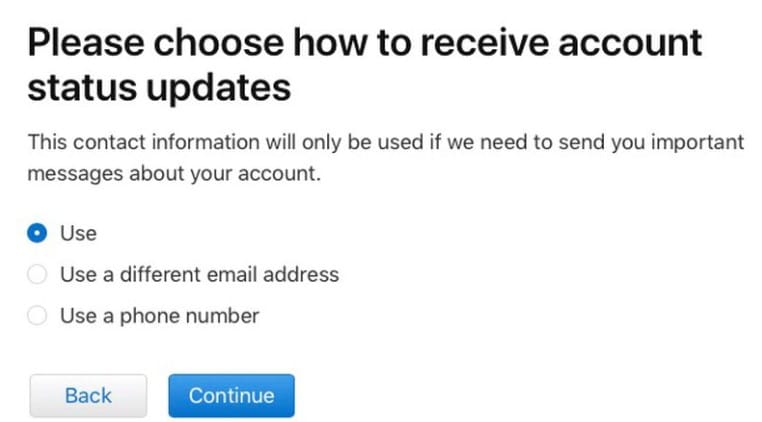
- Step 6: Follow the instructions provided to verify your identity. It may involve entering a code sent to your trusted device or answering security questions.
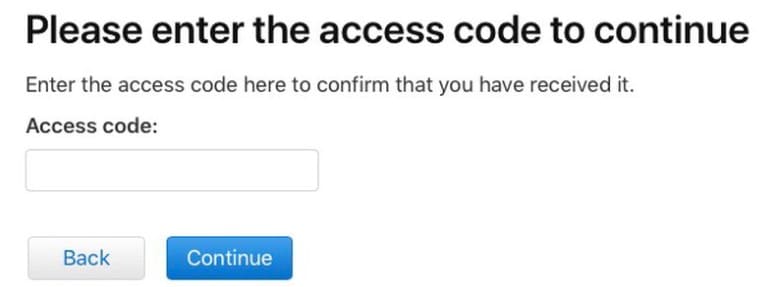
- Step 7: Review the summary of your deletion request, ensuring all details are accurate. Next, click Delete Account to finalize the deletion process.
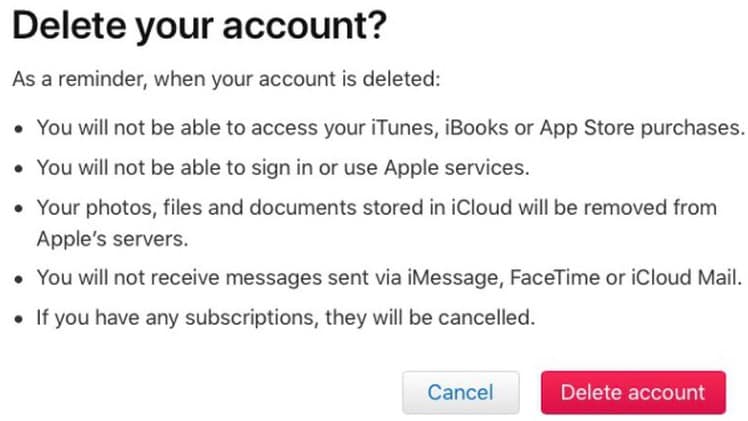
Part 4: How To Remove an iCloud Account Without a Password?
You’re not alone if you’ve forgotten your Apple ID password or bought a used iPhone with the previous owner’s Apple ID still on it. Many people find themselves in this situation, and it can be frustrating not being able to remove the iCloud account without the password. Fortunately, there is a way to do this using Dr. Fone’s iOS Screen Unlock tool:
- Compatible with all versions of iOS, including the latest iOS 17.
- Unlock different iPhone locks, such as screen locks and SIM locks.
- Bypass iCloud Activation lock
- Remove Apple ID even if the iOS device has enabled Find My service
Here’s a step-by-step guide on how to use Dr.Fone to remove an iCloud account without a password:
Step 1: Download and install Dr.Fone on your desktop.
Step 2: Launch the software and go to My Device. Follow the in-app instructions to connect your Apple iPhone SE to your computer using a USB cable.
Image name: how-to-delete-icloud-account-13.png
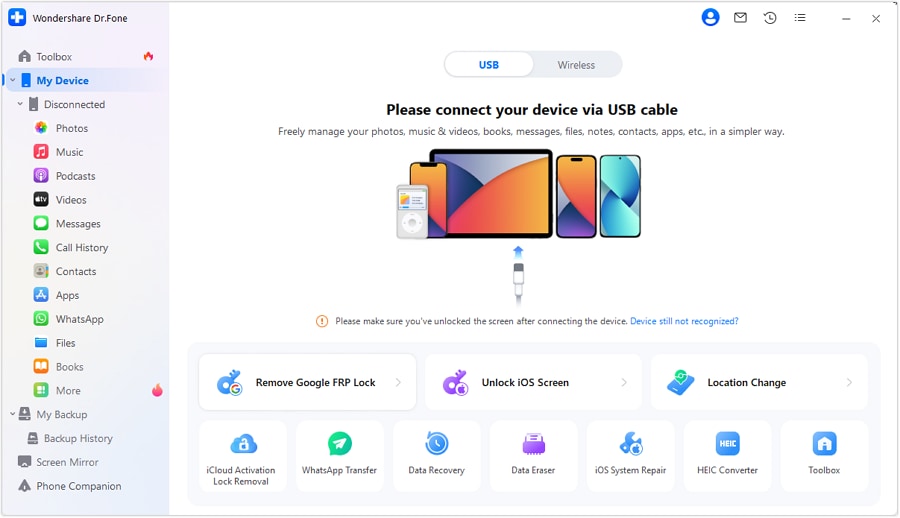
- Step 3: Go to Toolbox from the left navigation pane and select Screen Unlock > iOS.

- Step 4: Select Remove AppleID on the next window.
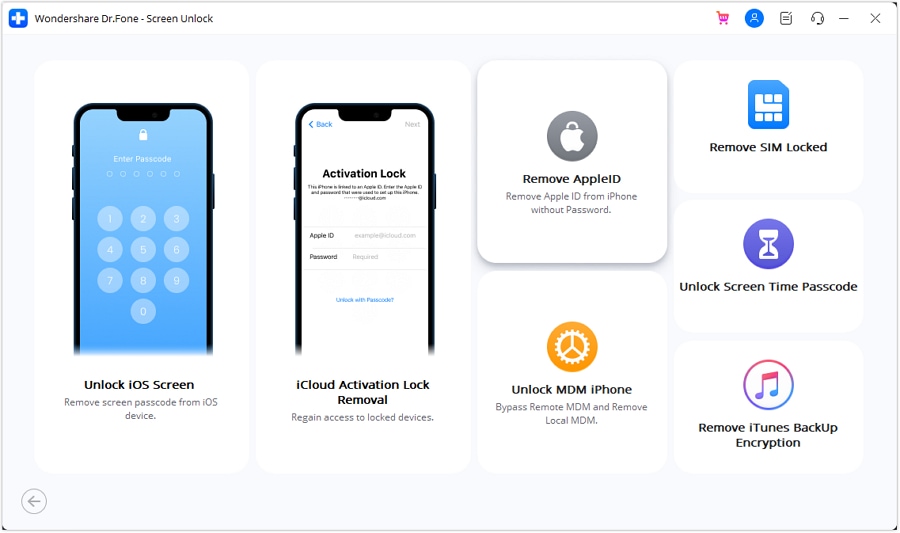
- Step 5: Click Unlock Now to proceed.
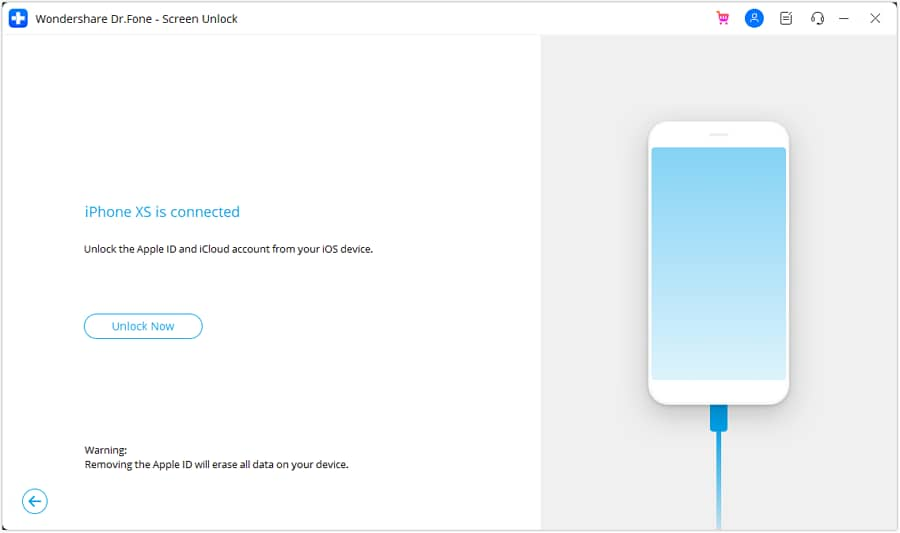
Note:
If you continue to “remove iCloud account“, this will erase all data from your Apple iPhone SE.
- Step 6: Click Yes if you have set up a screen lock.
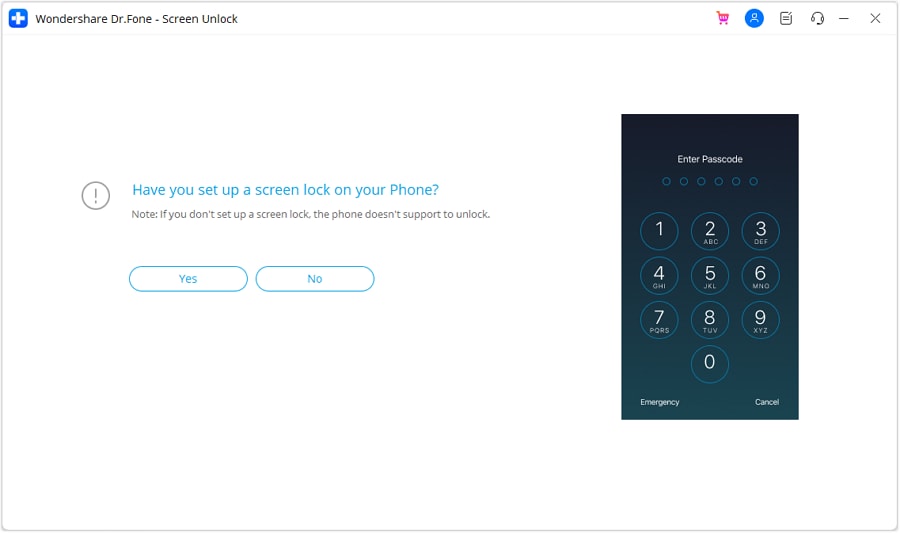
- Step 7: Click Yes if you have already enabled Two-Factor Authentication on your Apple iPhone SE.
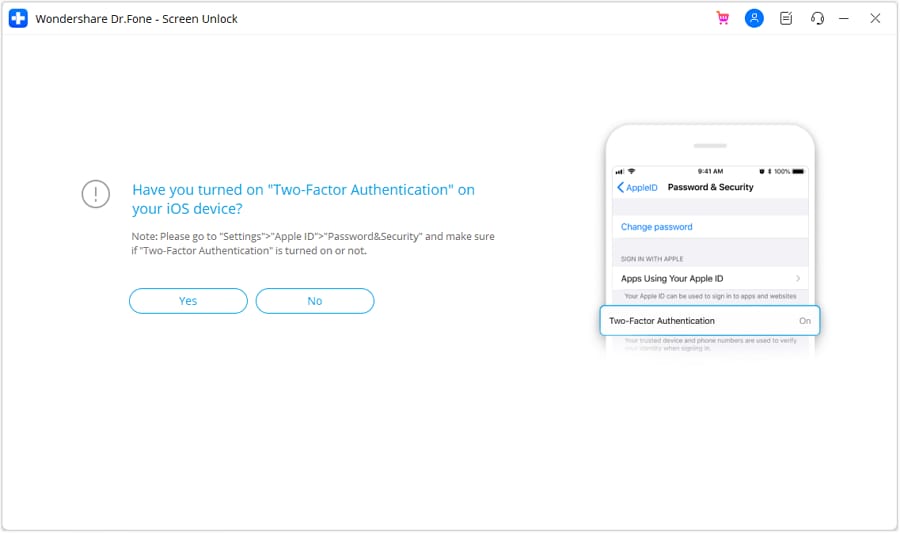
- Step 8: Follow the on-screen instructions to put your device into Recovery Mode.
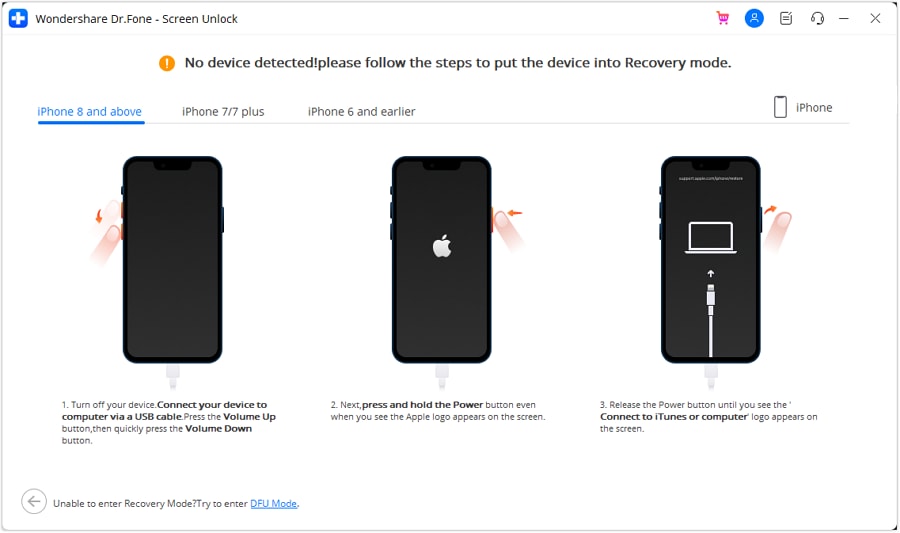
- Step 9: Dr.Fone will recognize your device in the Device Model. Choose an option from the System Version drop-down list and click Start.
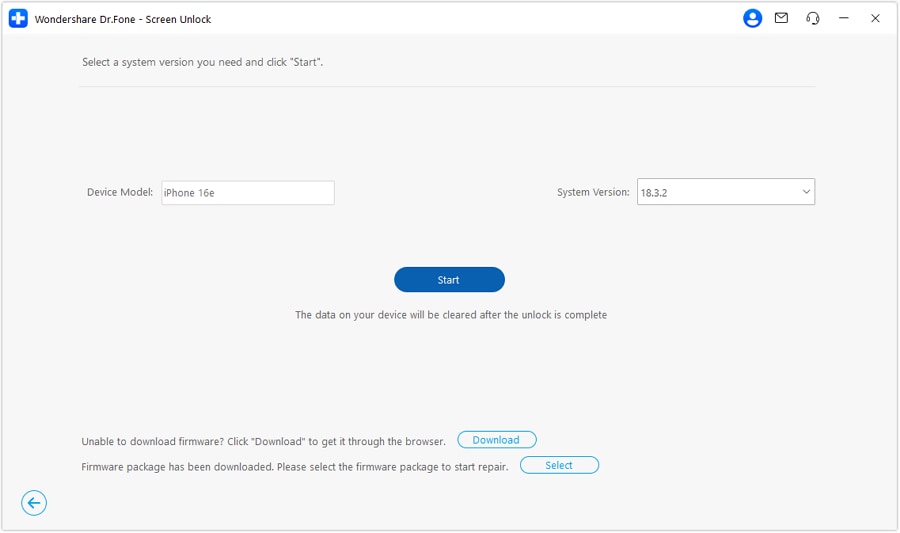
- Step 10: The latest iOS firmware is being downloaded.
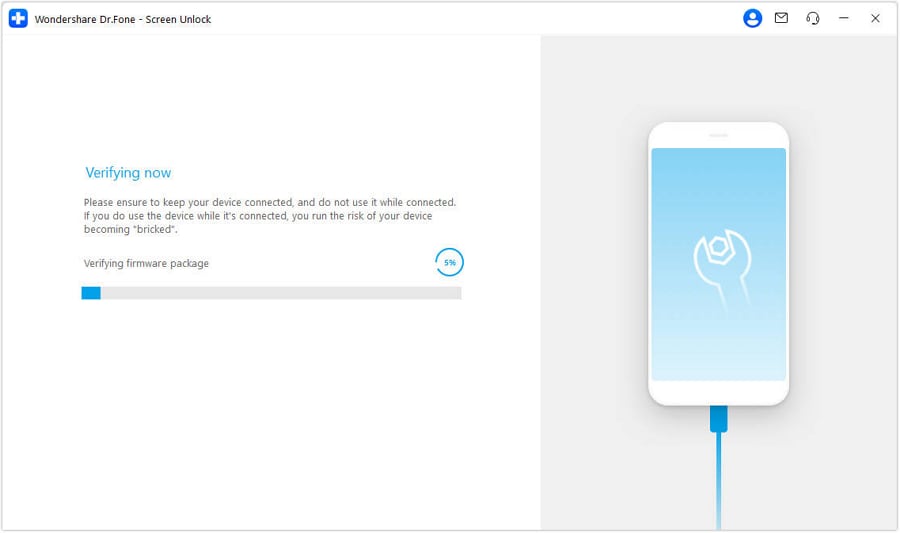
- Step 11: Click Unlock Now to proceed.
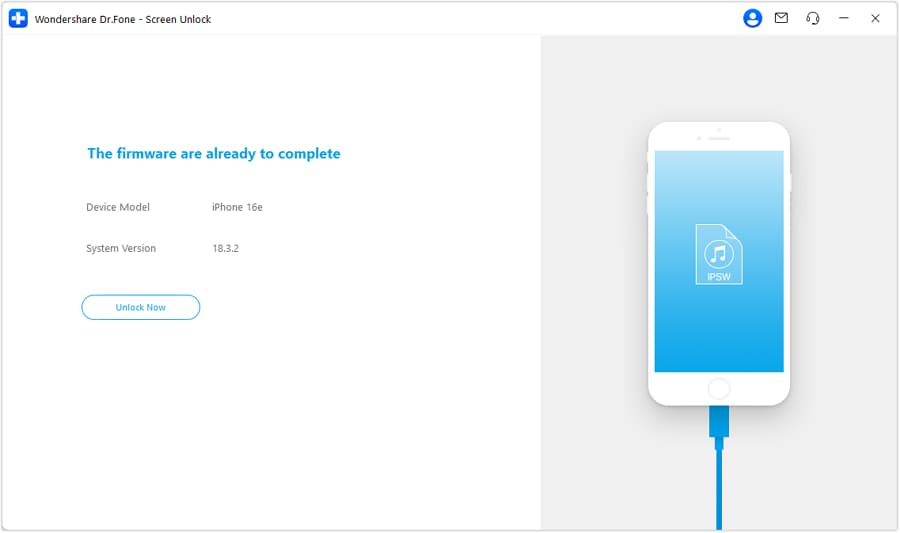
- Step 12: Enter the code given in the dialogue box and click Unlock to continue.
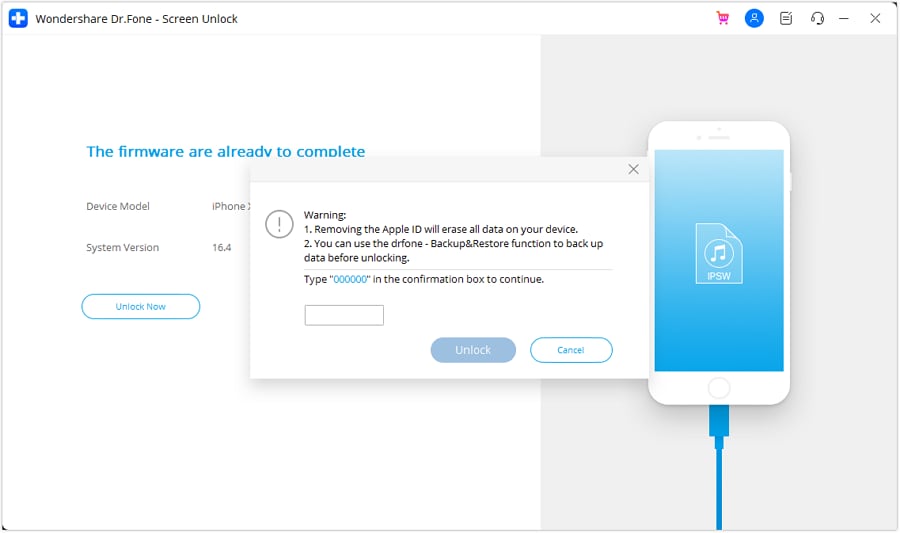
- Step 13: Dr.Fone will then begin removing the iCloud account. Do not disconnect or use your device while the process is ongoing to avoid device issues.
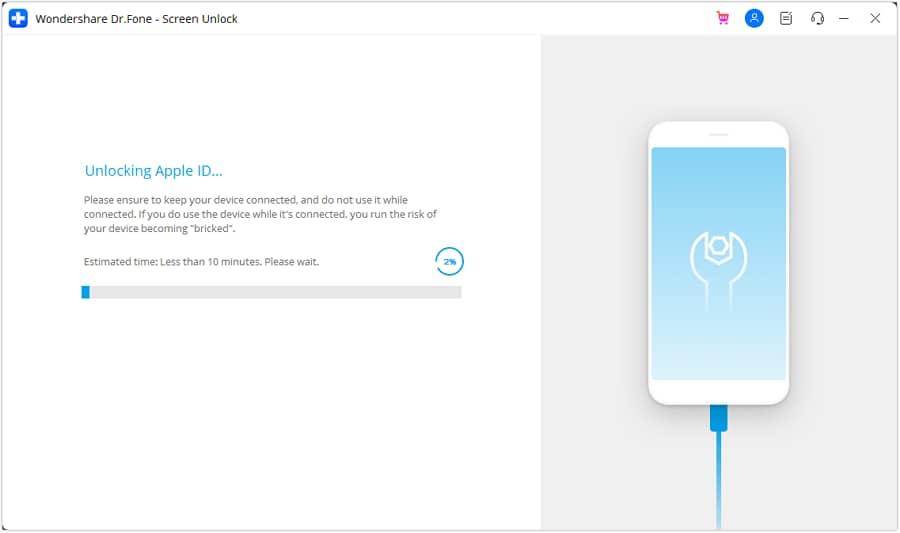
- Step 14: To finalize the Apple ID removal process, please check your device and click Done once you’ve verified it.
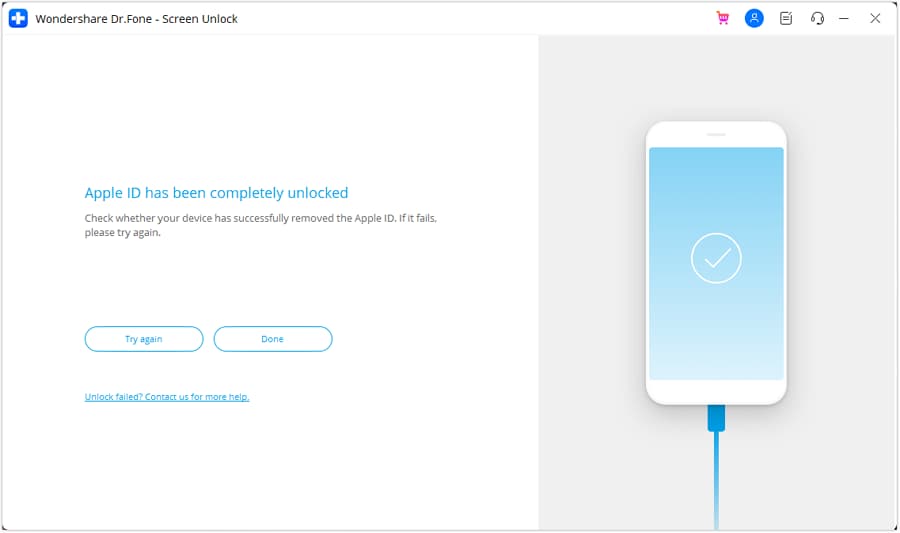
Part 5: How To Remove an iCloud Account Without Deleting an Apple ID Account?
Deciding to permanently “delete iCloud account“ or Apple ID is a significant step. If you’re unsure about this irreversible action, consider deactivating your account. Deactivating your Apple ID temporarily suspends it. However, this feature may depend on your location.
Once you deactivate your Apple ID, you can no longer use it to sign into any Apple services, including iCloud, the App Store, iTunes, Apple Books, FaceTime, and Apple Pay. Even so, deactivating your Apple ID does not delete your account. You can reactivate your account anytime to regain access to all your Apple services and data.
Here’s how to temporarily deactivate your Apple ID account:
- Step 1: Go to Apple’s Data and Privacy website. Sign in using your Apple ID.
- Step 2: Scroll down to the Temporarily deactivate your account section and click Request to deactivate your account.
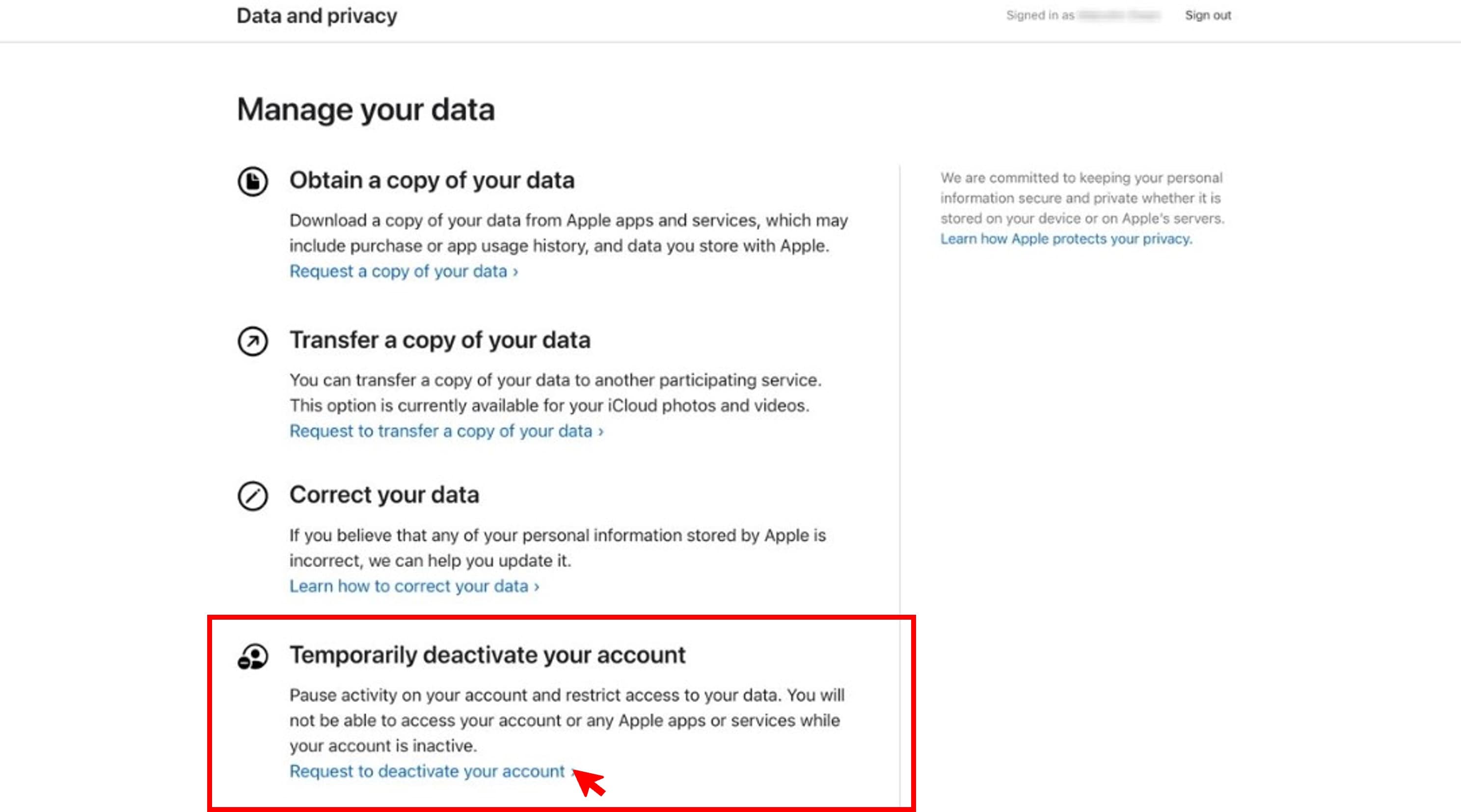
- Step 3: Select a reason for deactivating your account from the drop-down menu, then click Continue.
- Step 4: Review the information and follow the on-screen instructions to complete deactivation.
Note:
Keep the unique alphanumeric access code you’ll receive. You’ll need it to reactivate your Apple ID account.
More Article About iCloud Account:
Ways to Restore from iCloud Backup Without Reset
3 Ways to Recover iCloud Password
iOS 16: Best Ways to Bypass iCloud Activation Lock on iPhone/iPad
Conclusion
As you’ve learned, deleting an iCloud account is a permanent decision you cannot reverse. Once deleted, your account and all associated data will be permanently erased from Apple’s servers. Thus, it’s crucial to back up your data before proceeding.
Apps like Dr.Fone provide a comprehensive solution for backing up your data and removing an iCloud account without a password. Its user-friendly interface and streamlined processes make it an ideal choice for those seeking a quick and hassle-free experience. Whether you’re looking for an answer on “how to delete iCloud account“ or “remove iCloud account,” Dr.Fone is the ultimate tool to guide you through the process.
How To Fix Apple ID Verification Code Not Working On Apple iPhone SE
In smartphones, the Apple ID stands out as a cornerstone of security for iPhone users and the broader iOS ecosystem. Its robust verification features are a key reason why many people choose iPhones. Thus, its heightened security is highly valued. However, even extremely reliable systems can encounter hiccups.
Sometimes, you might need help with the issue of the Apple ID verification code not working. This leads to frustration, especially if you need to remember your Apple iPhone SE ID details. This 2024 guide will delve into practical solutions to fix issues with Apple ID verification codes, helping you regain access to Apple ID and peace of mind.

Part 1: When Does the Apple Verification ID Failed Prompt Appear?
Before diving into solutions, it’s essential to understand the various scenarios that can trigger the “Apple Verification ID Failed” prompt. Recognizing the cause of the problem is the first step toward the right fix. Let’s explore the common reasons you might encounter this issue:
Wrong Password Input
One of the most straightforward reasons for a failed verification is entering the wrong password. This could be a simple typing error or misremembering your password. Repeated wrong attempts can also lead to your account being temporarily disabled as a security measure.
Apple Server Issues
At times, the problem may not be on your end. Apple’s servers can experience downtime or technical glitches like any other online service. During such instances, verification processes might fail, as the server cannot authenticate your credentials.

Slow Internet or Intermittent Connection
A stable and reliable internet connection is improtant for the verification process. If your internet is slow or experiencing intermittent connectivity, it can disrupt the communication between your device and Apple’s servers, leading to verification failure.
Two-Factor Authentication (2FA) Issues
Apple’s two-factor authentication provides an extra layer of security. However, it can also be a source of problems. If there’s a delay in receiving the 2FA code or if 2FA fails to work, you won’t be able to complete the verification process. This could be due to network issues or, sometimes, glitches within the 2FA system itself.
Suspicious Activity
Apple takes your security seriously. If there’s any unusual activity detected on your account, such as login attempts from unfamiliar locations or devices, Apple might lock your account as a precaution. This can trigger the verification failed prompt as the system seeks to protect your account from potential unauthorized access.
By understanding these scenarios, you can diagnose better why you’re facing the issue of Apple verification ID not working. In the following sections, we will explore solutions tailored to these specific problems, helping you regain access to your account efficiently.
Part 2: How To Fix Apple ID Verification Failed
Encountering an “Apple ID Verification Failed” error can be frustrating. Here are some practical solutions that correspond to the common reasons for this issue. These steps should help you regain access to your Apple ID.
Method 1: Connecting to a Stabler Internet Connection
A stable internet connection is crucial. If you’re encountering issues, switch to a more reliable Wi-Fi network. Alternatively, toggling your Wi-Fi or mobile data off and back on can refresh your connection.
Method 2: Changing Password/2FA Device Using Apple ID Account
If you’re facing troubles due to password errors or 2FA issues, resetting your password or updating 2FA settings may help. Visit Settings > Apple ID account page > Sign In & Security and follow the instructions to Change Password or update your Two-Factor Authentication settings.

Method 3: Check iPhone’s Date & Time Settings
Incorrect date and time settings can influence Apple ID verification. Go to Settings, select General, and tap on Date & Time. Ensure Set Automatically is enabled, allowing your Apple iPhone SE to adjust these settings according to your time zone.

Method 4: Signing Out/In Your Apple ID
Sometimes, simply signing out and back into your Apple ID can resolve verification issues. Navigate to Settings, tap your name at the top, scroll down, and select Sign Out. After signing out, sign back in and check if the issue persists.
Method 5: Disabling VPN
If you’re using a VPN, it can sometimes cause issues with Apple ID verification. Try disabling your VPN from the Settings or the VPN app you’re using, and then attempt the verification process again.
Method 6: Updating to the Latest iOS
Running an outdated iOS version can cause compatibility issues. Go to Settings, select General, and tap on Software Update. If an update is available, download and install it to ensure your device is up-to-date.
Method 7: Checking Apple Server Status and Trying Again Later
Sometimes, the problem is on Apple’s end. Check the Apple System Status page to see if there are any issues with their servers. If there are, it’s best to wait and try the verification process later.
By following these methods, you should be able to resolve the “Apple ID Verification Failed” issue and regain full access to your Apple ID functionalities.
Part 3: How To Remove Apple ID Account From iOS Device
If the above fixes have proven unsuccessful, it might be time to consider removing the Apple ID directly from your device using a third-party tool. This can often resolve the failed verification of Apple ID on new or old phones when other methods fail.
Thankfully, Wondershare Dr.Fone offers a solution with its Screen Unlock (iOS) feature, which includes a Remove Apple ID/iCloud account removal function. It’s a very handy tool for reviewing verification requirements, especially when you forget your Apple ID credentials.
Removing Apple ID Account With Dr.Fone - Screen Unlock (iOS)
Here’s how to use powerful Dr.Fone’s - Screen Unlock (iOS) to remove Apple ID.
Step 1: Download, install, and launch Wondershare Dr.Fone.
Step 2: Go to Toolbox > Screen Unlock > iOS.

- Step 3: Select Remove Apple ID to proceed.

- Step 4: Choose Unlock Now once the connectivity status is confirmed.

- Step 5: Ensure you have a screen lock and the two-factor authentication enabled. Follow the on-screen instructions.

- Step 6: Put your device into Recovery Mode or DFU Mode by following the on-screen instructions. Then, confirm the correct system version of your device.

- Step 7: Wait for the download to finish on your software.

- Step 8: After the firmware is confirmed, click Unlock Now. Then, type in “000000” on the appearing text box and click Unlock.

- Step 9: After the process is completed, click Done. If it still doesn’t work, then click Try again.

Conclusion
Navigating the Apple ID Verification Code not working issue can be a source of significant frustration. This guide aimed to alleviate that by detailing common triggers, such as password errors, server issues, and connectivity problems, and providing targeted solutions like ensuring stable internet, updating iOS, and checking server status.
For those rare instances where conventional methods fall short, Dr.Fone emerges as a reliable ally. Its Screen Unlock feature effectively addresses Apple ID-related hurdles. Whether you’re grappling with verification failures or other phone-related challenges, Dr.Fone - Screen Unlock (iOS) stands out as a dependable tool, ready to assist in simplifying your digital life.
Tips: Are you searching for a powerful Screen Unlock tool? No worries as Dr.Fone is here to help you. Download it and start a seamless unlock experience!
Also read:
- [New] In 2024, Melodic Content and Legalities on Insta
- [New] In 2024, Unveiling the Secrets of Facebook Live's Dual Display
- [Updated] Facebook Group Video Downloader for 2024
- Everything To Know About Apple ID Password Requirements For Apple iPhone 11 Pro
- How to Remove an AirTag from Your Apple ID Account On iPhone X?
- In 2024, Apple ID Locked for Security Reasons On iPhone XS? Find the Best Solution Here
- In 2024, Everything To Know About Apple ID Password Requirements For Apple iPhone 12
- In 2024, How To Remove the Two Factor Authentication On iPhone X
- In 2024, How to Reset Apple ID and Apple Password On iPhone 6s Plus
- In 2024, Turning Off Two Factor Authentication From Apple iPhone 11? 5 Tips You Must Know
- Innovative & Inexpensive The Best Free YouTube Name Generators for 2024
- Intel Iris Plus GVT-2397 Graphics 640 Drivers: Update Guide - Fast & Simple Installation
- Step-by-Step Guide: Fixing Compatibility Problems with LG USB Devices on Windows Systems
- Tailored Talk for ChatGPT: 10 Custom Enhancements Explored
- Top AT&T Mobile Plans & Promotions in May 2024 - Insider's Guide
- Top-Notch Solutions for Disabled Apple ID From Apple iPhone XR Making It Possible
- Updated In 2024, Elevate Your Video Storytelling with Professional Voiceovers
- Title: In 2024, iCloud Separation How To Disconnect Apple iPhone SE and iPad
- Author: Alma
- Created at : 2025-02-25 10:31:08
- Updated at : 2025-03-04 03:56:40
- Link: https://apple-account.techidaily.com/in-2024-icloud-separation-how-to-disconnect-apple-iphone-se-and-ipad-by-drfone-ios/
- License: This work is licensed under CC BY-NC-SA 4.0.